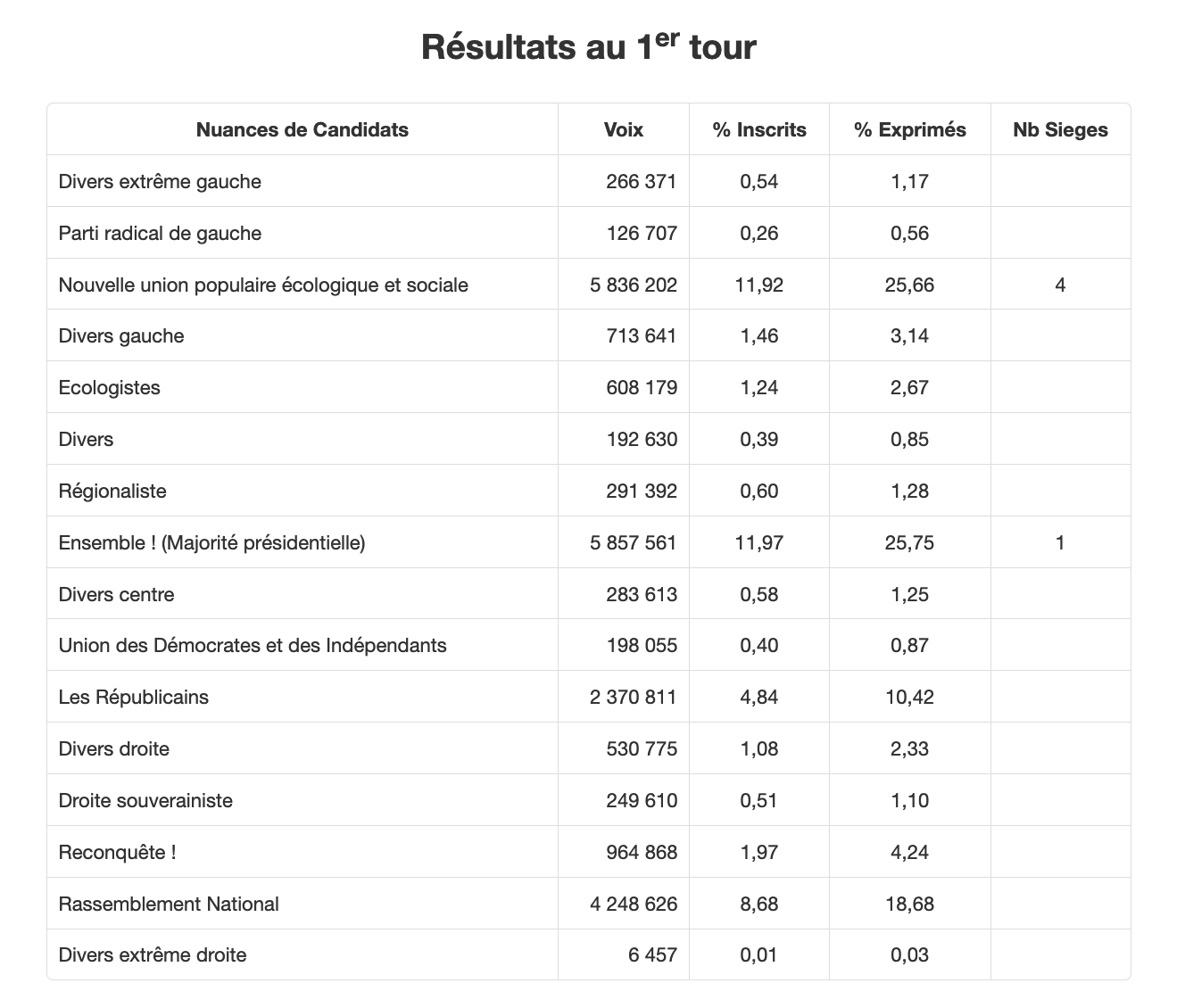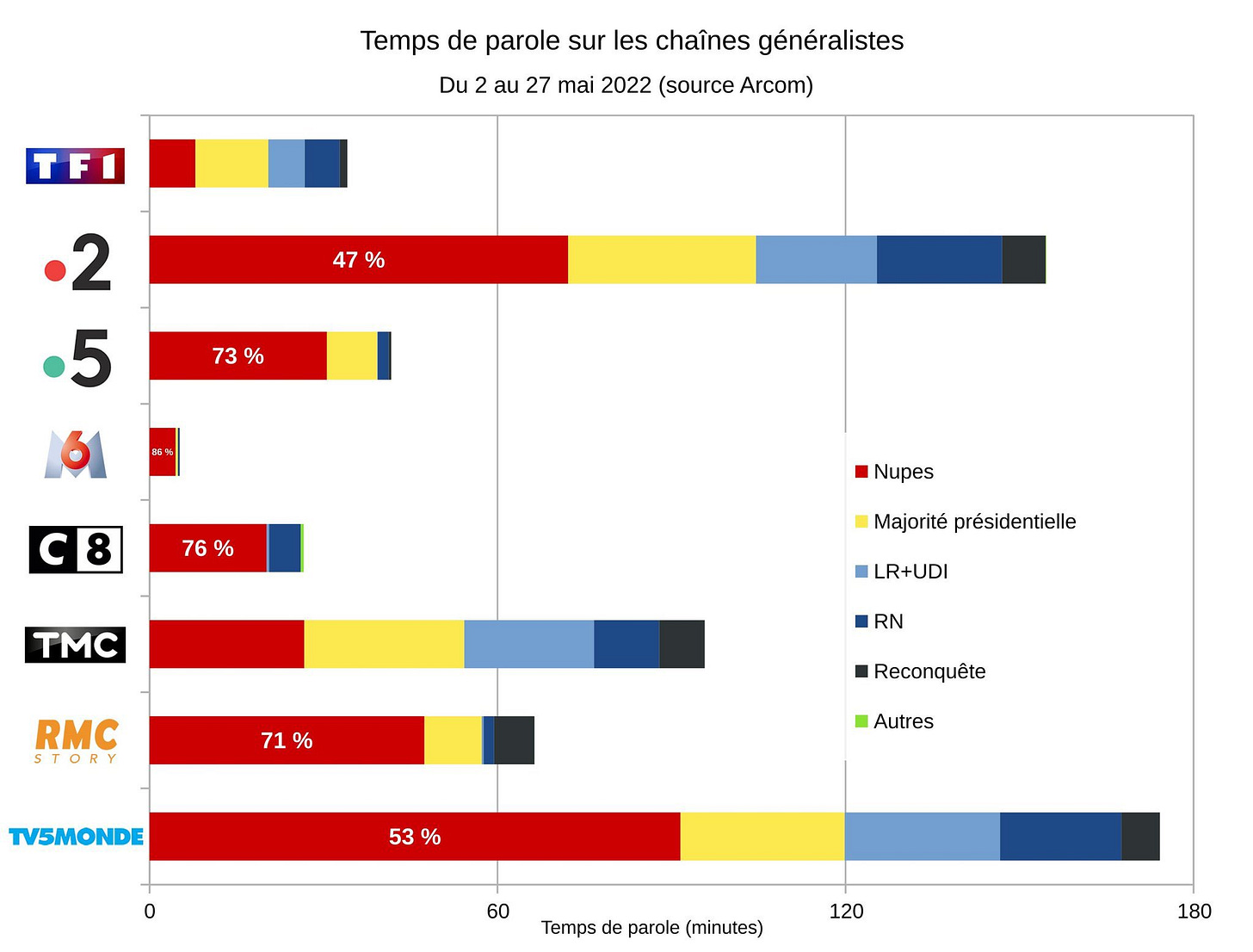French Crossroads: Super Duper NUPES And Fuzzy French Election Results
Everybody won and everybody lost and nobody knows what happens next but let's do it all again next weekend.

If you are a lover of uncertainty and anxiety and confusion, then France is the place to be for at least one more week. And possibly for 5 more years.
On Sunday, France held the first round of its legislative elections. Round 2 will be this Sunday. In between, the initial results will provide plenty of fodder for the French to engage in gladiatorial debates over how wrong someone else’s political opinions are.
The big storyline from Round 1: The coalition of left-leaning parties dubbed NUPES (paging emergency branding team, stat!) came out on top-ish in the voting. The NUPES (La Nouvelle Union populaire écologique et social) is an alliance of the Greens, the Party Socialist, the Commies, and the far-left La France Insoumise.
I say “top-ish” because there is not 100% agreement on vote totals. There is some debate about which candidates were officially part of the NUPES. That is largely a marginal issue, but still, in the claim for momentum, such differences can loom large.
Official government counts put President Macron’s center-right coalition, Ensemble, slightly ahead with 25.75% to 25.66% for NUPES. According to Le Monde, however, government tallies did not include all NUPES candidates, and so they put NUPES ahead by 26.10 % to 25.81%.
Again, these differences are mostly academic. What matters ultimately is how many seats a party or coalition holds. After the first round of voting, any candidate that received more than 12.5% of the vote advances to the second round this Sunday. And so that means there could be more than 2 candidates in the 2nd round which leads to widely varying guestimations of how this first round will translate into actual assembly seats.
Below is just one example. Another put Ensemble’s estimated range at 255 to 295.
There are 577 National Assembly seats, and a government needs 289 for a majority. So what we can say absolutely is that it is uncertain whether Macron’s coalition will win a majority. Certainly, it will be less than his current 346 seats and speaks to the lack of enthusiasm he has sparked in this election season even as he has marched to victory.
Should he fall short, what happens next is going to be largely a matter of political posturing and conjecture, with both being driven by the actual results and the perception of the results.
In one scenario, Macron creates a coalition with the center-farther-right-but-not-extreme-right Les Republicains and thus gets pulled - ironically given the renewed influence of the left - further to the right politically. Or, he rounds up some dissident NUPES members and drifts ever so slightly leftward (something he has tried to hint he wants to do with some of his new choices for ministers).
NUPES FTW?
There doesn’t seem to be a chance that the NUPES will gain a majority and force Macron to appoint La France Insoumise leader Jean-Luc Mélenchon as prime minister. But what can we say about the impact of NUPES?
For one thing, the political conversation in France has done a remarkable u-turn over the past month. From rampant hand-wringing over the far-right, now the focus has turned to the threat/promise of a newly united left. Consider just how the NUPES have dominated the French news programs over the past month according to this breakdown of air time each party was given on major TV channels (h/t Parisienne/@75002Parisienne):
Of course, much of this coverage involved the drama around the formation of the NUPES. But still, it seems likely NUPES will leapfrog Les Republicains to become the main opposition party in the Assembly. That doesn’t necessarily come with a lot of meaningful power, but it will validate NUPES’ standing.
Yet, despite the enthusiasm for the left’s rebirth, turnout for the legislative election was down from 5 years ago. And NUPES still received a lower percentage of the vote than their 4 separate candidates did in the first round of the presidential election:
So why does this look like a victory for NUPES? Part of this is expectations. All the talk a few weeks ago was that the French left was dead due to divisiveness, ego, and silly turf wars. Now, they are on track to be the main opposition party. That’s clearly a win. If they can hold that coalition together for 5 years, and find a way to expand it, then the left will be on track toward becoming a force in French politics gain.
Also, demographic polling shows a strong generational split, with the left drawing much of its strength from the youth. The future of France leans toward the left.
Hopefully, we will hear a robust debate about France’s economic future this week that contrasts the economic program of Macron and NUPES, though it’s probably more likely coverage will become mired in horse races. After 5 years, Macron has not convinced a majority of French to support his liberalization and reform program. Between NUPES and Marine Le Pen, the majority would seem to favor greater economic protectionism.
Round 2
While we know the broad outlines now, what will happen next Sunday will be anyone’s guess. These are 577 elections and the results of the 2nd round will be influenced by results that have as much to do with circumstances as they do with politics and parties.
For instance, there are 8 races with 3 candidates, according to Le Monde. Then there are 276 where it's NUPES vs Macron’s Ensemble candidate and 108 pitting Marine Le Pen’s RN against Ensemble. It’s tough to predict the outcome of all these combinations.
Consider the race involving Rachel Kéké. The cleaning woman born in the Ivory Coast is one of the more extraordinary stories of this election. In 2019, she helped lead a dramatic 22-month strike against a hotel to improve working conditions and pay. There has been a lot of buzz in the French media about her possibly becoming the first hotel cleaning woman to be elected.
Running as part of NUPES, she finished the first round with 35.74% of the vote to 24% for the Macron candidate. But the third and fourth place finishers are from the right with more than 28% combined. At first glance, that would seem to give the advantage to Macron’s candidate. But about 11% of that vote came from Marine Le Pen’s National Rally party, which has a populist economic agenda and has made big working-class inroads.
The odds are probably still against Kéké winning, but we’ll see which way these other voters break — and which ones bother to show up. This is the kind of political calculation that has to be made 576 times to estimate the 2nd round outcome.
Baker Stéphane Ravacley is another folk hero running under the NUPES banner. In 2021, Ravacley staged a hunger strike to protest attempts to deport his apprentice who had immigrated from Guinea. Ravacley just finished ahead of the Macron candidate in his district, but the 3rd and 4th place candidates come from the center-right and far-right, meaning he’s also facing a tight 2nd round vote where the winds would seem to be blowing against him.
In this mix of races, there are 61 where a NUPES candidate faces a far-right RN candidate. This has sparked a mini-controversy because Macron’s supporters have sent mixed messages on how they are advising their troops to vote in such races.
Historically, in the presidential election when a far-right candidate reaches the final, everyone else is expected to rally against them in a Front Republicain. But in 2017 and 2022, Mélenchon called for supporters to not vote for the far-right candidate but did not tell them to vote for Macron. Now, Macron’s camp seems to be returning the favor. His prime minister, Elisabeth Borne, called for votes against “extreme” parties, which implied both the NUPES and Le Pen’s RN. Another spokesman suggested they would advise Macron supporters in these races on a case-by-case basis, while the education minister called more explicitly for voting against the far-right. The lack of clarity has come across as both cynical and spineless.
One definitive piece of good news: The bogeyman of French politics Éric Zemmour failed to advance past the first round in his election bid. It seems too much to ask that news programs will stop giving oxygen to this human troll. But for now, he’s emerged as one of this election season’s biggest losers.
Finally, a note about Le Pen. Her Rassemblement National is poised to at least double its current number of 8 Assembly seats, which will give it an official presence for the first time in a couple of decades. Les Republicains will probably still win more seats. But for now, it’s the right’s turn to have an existential debate about its future as its presence in the Assembly shrinks.
Chris O’Brien
Le Pecq, France







